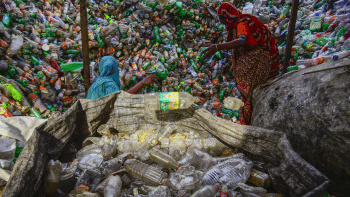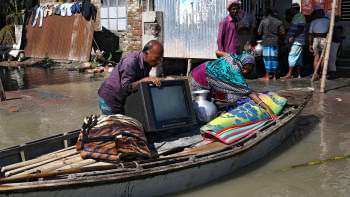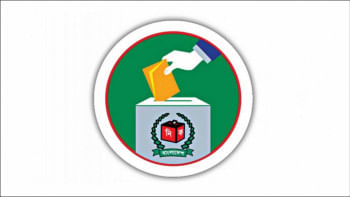The time to beat plastic pollution is now or never

Plastics have become an integral part of our life. The world purchases around one million plastic bottles every minute and uses one billion plastic bags every hour. Low cost, durability, light weight, and ease of processing have made plastics extremely attractive to both individual consumers and industries.
While there may be some social benefits of using plastic, these come at the cost of our environment, severely threatening humanity and biodiversity. While the efforts to reduce plastic pollution by governments, civil societies, and businesses are encouraging, there is still a long way to go as the amount of plastic waste is rapidly increasing. This year's World Environment Day is essentially a call for widespread action to beat plastic pollution and save humanity, wildlife, and our entire planet.
Plastic is a potential threat to life and is now considered the most pressing environmental concern. Almost half of all plastic products are intended to be single-use, and of the around 380 million tonnes of plastic produced each year globally, only nine percent is recycled. A report published by the United Nations Environment Programme (UNEP) in 2022 says around three-fourths of plastic products worldwide end up in landfills or natural surroundings. Plastic waste takes a long time to decompose as the materials used in the products do not exist in our environment, and there are no naturally occurring organisms that can break them down effectively. The time taken for plastic products to decompose can differ depending on their type and the condition of exposure. For example, a plastic bag can decompose in 10 to 1,000 years, while a plastic bottle, an essential part of our daily life, can take up to 450 years to degrade. Untreated plastic waste also adds toxic substances to our environment.
Plastic is also impacting the atmospheric condition of the Earth's system. Almost 98 percent of plastic products are produced using fossil fuels, resulting in greenhouse gas (GHG) emissions, a leading contributor to the global climate crisis.
The Organization for Economic Co-operation and Development (OECD) reported that plastic currently accounts for 3.4 percent of the world's carbon budget and is projected to increase by five times in the next 20 years. A 2022 study identified that tiny particles of plastic can travel thousands of miles and affect the formation of clouds, and can impact temperature, rainfall, and even long-term climatic changes.
Bangladesh, too, is experiencing a spike in plastic production, which plays a crucial role in the nation's overall economy. It is the 12th highest source of income through export and is widely used in our RMG sector, healthcare, and automotive industries. In FY 2017-18, the country exported plastic and plastic-made products worth $1 billion. And almost 80 percent of the local plastic demand, worth $2.5 billion as of 2017, is met with domestic production. According to Bangladesh Investment Development Authority (BIDA), there are 5,000 plastic enterprises in Bangladesh, and 98 percent of these are SMEs. Plastic products have gained popularity over time both in local and global markets, and if the current trend of production is sustained, Bangladesh expects to earn $115.10 billion from plastic export by the end of 2023.
However, the country is also battling plastic pollution. Alongside the growing nature of our economy, the per capita use of plastic in urban areas has tripled in the last 15 years. Although the per capita consumption in Bangladesh is less than that in many other developing and neighbouring nations, the mismanagement of plastic waste is what has led to Bangladesh ranking 10th globally in mismanaging plastic waste. It is also responsible for 2.4 percent of the global mismanaged plastic waste.
Unsustainably managing plastic waste is a growing concern in Bangladesh. The country generates around 3,000 tonnes of plastic waste every day. In Dhaka, around 14 million pieces of polyethylene bags are used daily. Most plastic products are discarded after the first use, and due to improper management, they pile up on the roads, in drains, canals, rivers, and open landfills.
As a riverine delta, our geographic characteristic plays a huge role in transporting land-based plastic waste to the ocean. An estimation shows that every day, around 73,000 tonnes of plastic waste ends up in the Bay of Bengal through the Padma, Jamuna, and Meghna rivers, polluting our aquatic ecosystem.
Plastic products can never fully decompose, and can only be reduced to smaller particles. The tiny particles also end up in the human body and incur severe health consequences. Meanwhile, burning plastic items (which is a common practice in Bangladesh) releases toxic gases and particles into the air. The Country and Climate Development Report published by the World Bank Group in 2022 says that around 32 percent of human deaths every year are associated with environmental degradation, specifically outdoor air pollution, inadequate water, sanitation, and hygiene standards, and lead exposure among adults linked with plastic pollution. The estimated annual loss for environmental health amounted to Tk 4.4 trillion in 2019. Plastic waste is also responsible for clogging drainage systems, and developing breeding grounds for mosquitoes that result in incidents of vector-borne diseases such as dengue, chikungunya, and malaria.
Bangladesh has taken several bold steps by adopting legislative and policy arrangements to reduce plastic pollution. We are the first country in the world that banned plastic shopping bags through a nationwide cut-off date on January 1, 2002. The country adopted the Jute Packaging Act in 2010, which promotes alternative packaging for six essential items, including rice, fertiliser, and paddy. In 2020, a High Court directive also banned single-use plastic in coastal areas, and in hotels and motels across the country. But all these measures have failed due to lenient enforcement. Use of banned plastic items and mismanagement of plastic waste is seen all over the country. Our plastic market is anticipating significant growth and as such, plastic waste generation will also increase in volume, and the crisis will only intensify in the coming years.
Recycling plastic waste is an economically and environmentally viable way to address plastic pollution, though the progress of this is not significant in Bangladesh. In 2020, the nation consumed 977,000 tonnes of plastic and recycled only one-third of the total. In Dhaka, around 646 tonnes of plastic waste is generated every day and only 37.2 percent is recycled. A large amount of plastic waste remains in the environment. High costs associated with recycling, lack of technology, and lack of public awareness about the consequences of plastic pollution are key factors that hinder recycling in Bangladesh.
It is irrefutable that widespread access to plastic has benefited humans. But at the same time, mismanagement of plastic has left long-lasting environmental impacts. Alongside the rapid economic growth of Bangladesh, the consumption of plastic is likely to experience a spike in the coming years, resulting in more degradation of environmental bodies, and affecting humans and other living creatures.
Despite our country's strides in policy and legislative arrangements, the effective implementation of the policies and laws is still a far cry. Besides the need for effective regulation and enforcement initiatives from the government, individual-level awareness is also crucial in addressing this problem. A strong focus on the circular use of plastic, based on the 3R strategy (reduce, reuse, recycle) will result positively in creating new value chains of plastic, green skills, jobs, and innovative products, while also addressing social and environmental challenges that occur due to our widespread use of plastic. More research and knowledge processes, as well as engagement of stakeholders in multisectoral actions, will be driving factors in successfully curbing plastic pollution. Now is the time to act together and save our world from this impending crisis.
Muhammad Muktadirul Islam Khan, a development consultant, is currently studying at the Department of Geology, Environment and Sustainability (GES) of Hofstra University in New York.

 For all latest news, follow The Daily Star's Google News channel.
For all latest news, follow The Daily Star's Google News channel. 












Comments